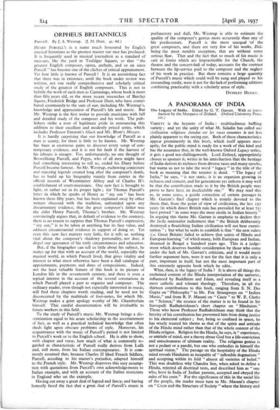ORPHEUS BRITANNICUS
Purcell. By J. A. Westrup. (J. M. Dent. 4s. -6e1.)- - -
HENRY PURCELL'S is a name much honoured by English musical historians as the greatest master our race has produced.
It is frequently used in musical journalism as a standard of measure, like the yard in Trafalgar Square, so that " the greatest English composer, opera, anthem, and so on since Purcell " has become one of the clichés of critical appraisement. Yet how little is known of Purcell ! It is an astonishing fact that there was in existence, until the book under review was written, not one really comprehensive and scholarly critical study of the greatest of English composers. This is not to belittle the work of such men as Cummings, whose book is more than fifty years old, or the more recent researches of Barclay Squire, Frederick Bridge and Professor Dent, who have contri- buted enormously to the sum of our, including Mr. Westrup's,
knowledge and appreciation of Purcell's life and music. But Mr. Westrup is the first writer to provide musicians with full and detailed study of the composer and his work. The pub- lishers strike a note of legitimate pride in announcing this addition to their excellent and modestly priced series, which includes Professor Einstein's Gluck and Mr. Blom's Mozart.
It is hardly surprising that our knowledge of Purcell as a man is scanty, for there is little to be known. Mr. Westrup has been at enormous pains to discover every scrap of con- temporary evidence, and it is not his fault if the harvest of his labours is meagre. For, unfortunately, no one thought of Boswellising Purcell, and Pepys, who of all men might have had something interesting to tell us, ended his Diary before Purcell became famous. So Mr. Westrup, eschewing conjecture and rejecting legends created long after the composer's death, has to build up his biography mainly from entries in the official records of Westminster Abbey and of Charles II's establishment of court-musicians. One new fact is brought to light, or rather set in its proper light ; for ThomaS Purcell's letter in which he speaks of Henry as " my son " has been known these fifty years, but has been explained away by other writers obsessed with the tradition, unfounded upon any documentary evidence, that the great composer's father was the elder Henry Purcell, Thomas's brother. Mr. Westrup convincingly argues that in default of evidence to the contrary, there is no reason to suppose that Thomas Purcell's expression, " my son," is to be taken at anything but its face value, and adduces circumstantial evidence in support of doing so. Yet even this new fact matters very little, for it tells us nothing vital about the composer's shadowy personality, nor does it dispel our ignorance of his early circumstances and education.
But, if the biographer can tell us little about his subject, he makes up for that with an account of the world, especially the musical world, in which Purcell lived, that gives vitality and interest to what must otherwise have been a dull catalogue of appointments, payments and dates of compositions. Indeed, not the least valuable feature of this book is its picture of London life in the seventeenth century, and there is even a topical interest in the account of the several coronations in which Purcell played a part as organist and composer. The ordinary reader, even though not especially interested in music, will find these chapters worth reading, and he need not be disconcerted by the multitude of foot-notes, for which Mr. Westrup makes a grim apology worthy of Mr. Chamberlain himself. This careful documentation will be invaluable to future workers in this field.
To the study of Purcell's music Mr. Westrup brings a dis- crimination equal to his acute scholarship in the ascertainment of fact, as well as a practical technical knowledge that often sheds light upon obscure problems of style. Moreover, his acquaintance with the music of Purcell's period is not limited to Purcell's work or to the English school. He is able to shoW, with chapter and verse, how much of what is commonly re- garded as characteristic of Purcell really derives from Lulli and, still more, from his Italian contemporaries. It is com- monly assumed that, because Charles II liked French fiddlers, Purcell, acceding to his master's prejudice, adapted himself to the French style. Mr. Westrup disproves this easy assump- tion with quotations from Purcell's own acknowledgements to Italian example, and with an account of the Italian musicians in England who set the example.
Having cut away a great deal of legend and fancy,. and having honestly faced the fact that a great deal of Purcell's music is
perfunctory and dull, Mr. Westrup is' able to estimate' the quality of the composer's genius more accurately than any of phis- predecessors. Purcell is the most unequal 'of the great composers, and there are very few of his works, Dido being the most - notable exception, that are without some serious_ flaw. That and the fact that so much of his music is cast in forms which are impracticable for the Church, the theatre and the concert-hall of today, accounts for the contrast between the lip-service paid to the composer and the neglect of his work in practice. But there remains a large quantity of Purcell's music which could well be sung and played to his resounding credit, were it not for the lack of performing editions combining practicality with a scholarly sense of style.
DYNELEY HUSSEY.


































































 Previous page
Previous page